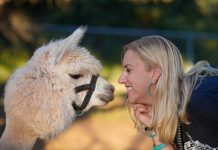The El Cajon youth rocketry team, the SkyScrapers from Vocational STEAM Works has qualified in the top 100 again, and now moves to compete at the National Finals on May 20 in Plains, Virginia. The champion of the national competition earns an all-expense paid trip to the International Rocketry Challenge at the Paris Air Show in June, competing for $100,000 in prizes. The top 25 teams automatically receive invitations to NASA’s Student Launch Workshop.
This year’s competition featured nearly 800 teams and 4,500 students from 45 states. For 2023, each team was required to design, build, and launch model rockets that safely carry one large hen egg to an altitude of 850 feet, stays airborne for between 42 and 45 seconds, and returns the rocket to the ground safely. The rocket must separate into two parts after apogee—one section of the rocket must contain the egg and altimeter, and the second the rocket motor(s)—and both parts must land with their own parachutes.
Vocational STEAM Works Board member and team mentor John Pacente said he mentored four teams this year and three made it to the finals, including SkyScrapers. He said the competition is a combination of both vocational and academic work, with the youth picking up the academic portion at school, and STEAM Works applies that education into a working rocket so they can actually get it in the air and compete.
“Giving them a feel of what it takes to send an astronaut into space,” he said. “A sixth grade through twelfth grade competition,” adding that the rockets must be made to certain specification to compete. “The hens egg represents the astronaut. Cracking or damaging that egg in any way is an automatic disqualification. Along with that they have an altimeter which records the actual height of the rocket.”
Pacente said height and duration of flight is key, and anything above or below the specifications for the competition either deducts or adds points, with the goal of being exact, with a score of zero.
“In Virginia, the height and duration are changed, so they will determine that through a coin toss,” he said. “With that, using all the data they have collected all year, they apply that to their rocket, do the launch, and if they fall in the 40%, they continue through the competition. If not, the other 60% are out after the first launch.”
Pacente said the winner, going to the Paris competition is paid by Raytheon Technologies, and compete with others around the world such as England, France, Japan.
Pacente said now, aerospace is huge, and the youth finds them.
“Schooling has changed,” he said. “Colleges are looking for kids that have competed in rocketry one way or another because colleges have upper-level rocket teams now,” he said. “Industries finally stepped up and found if they contribute to universities, they have people coming out that have worked with rockets hands on and not just through a handbook.”
Pacente said California has changed so much, as 10 years ago, schools were doing The American Rocketry Challenge competitions.
“Certain things have fallen in place where schools do not want the responsibility of having a rocket team, and because it is categorized as a sport, they do not want to put the money into it,” he said. “You see it on the wayside in high schools and middle schools. The kids are the ones that actually found a loophole on how to compete. About five years ago, kids started making their own nonprofits so that they could compete. That is how Vocational STEAM Works started. We had a team that could not compete at the end of COVID. Other states were competing but all the parks in California were closed. A kid asked what they could do and that is why we started Vocational STEAM Works, a nonprofit, so the team could compete under it.”
Pacente said this year is exciting because Texas is usually dominant, and California beat out Texas this year.
“All the mentors are really happy about that and proud,” he said. “California has 15 teams that made it to nationals this year, and Texas has nine, with Iowa and Alabama. With the 15 teams out of California, eight of those have done their qualifying launches out at Fiesta Island in San Diego. It is a big moment. The mentors have been working about five years on this to get to this point. We have a lot of smart kids out here in California.”
Pacente said they just got back from Huntsville, Alabama with a team. That is a team above the TARC team.













